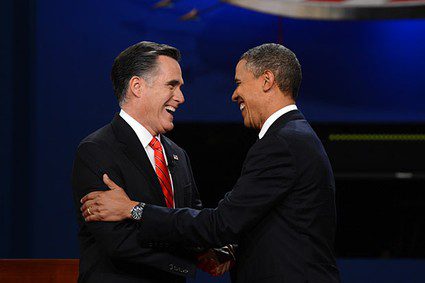Here for your enjoyment are Dalrymple’s Rules of Debate Interpretation.

1. Television pundits, in the immediate aftermath of the debate, are the worst possible guides to understanding the debate and how it will shape the electoral landscape. It’s just another spin room, except the allegiances and antipathies, the man-crushes and job tryouts are concealed.
2. Anyone who said that a candidate’s speech sent “a thrill up my leg” should be forever disqualified from post-debate analysis.
3. Whichever side rushes to judge the debate a “draw” probably lost. Given the echo chamber effect, if it were really a draw, each side would think they won.
4. Candidates aren’t out to “win” the debate. They’re out to win the presidency. The only relevant question — the only relevant question — is this: Did the candidate help or harm his chances on election day?
5. We think we’re watching a game of checkers, but the candidates are playing a game of chess. Entering the debate, they know specific demographics and specific regions to appeal to, specific qualms to address, specific areas in which they need to strengthen their image — as well as specific weaknesses and misgivings about the opponent to exploit. A comment that seems bizarre to a highly educated Bostonian male may be precisely what a soccer mom in Ohio needed to hear.
6. Combining #4 and #5: a candidate may well “lose” on points but “win” the night by making uncommitted seniors in Florida more comfortable with him, or attracting more blue-collar Catholics in Ohio. Americans are not choosing a representative for an Oxford debate. They’re choosing a leader. Many “winners” are not leaders.
7. This is why the “Who won the debate?” insta-polls are practically worthless. Slightly less worthless are the polls on “Did this debate make you more or less likely to vote for X?” A smidgeon more valuable still are the polls of likely voters 5-7 days after the debate. But the real measure is the polls of likely voters in battleground states 5-7 days after the debate.
8. The candidate who attacks the most aggressively is the candidate whose internal polling shows him behind. The leader has more to lose, and attacks are risky.
9. A strong incumbent will run on his record and his agenda for four more years. He will let the challenger attack and seem small. But as Obama himself said in 2008: “…if you don’t have any fresh ideas, then you use stale tactics to scare voters. If you don’t have a record to run on, then you paint your opponent as someone people should run from. You make a big election about small things.” (Big Bird much?)
10. “Winning” the post-debate spin is more important than “winning” the debate itself. An otherwise brilliant performance can be undermined by a single wayward comment exploited in a million ads.










